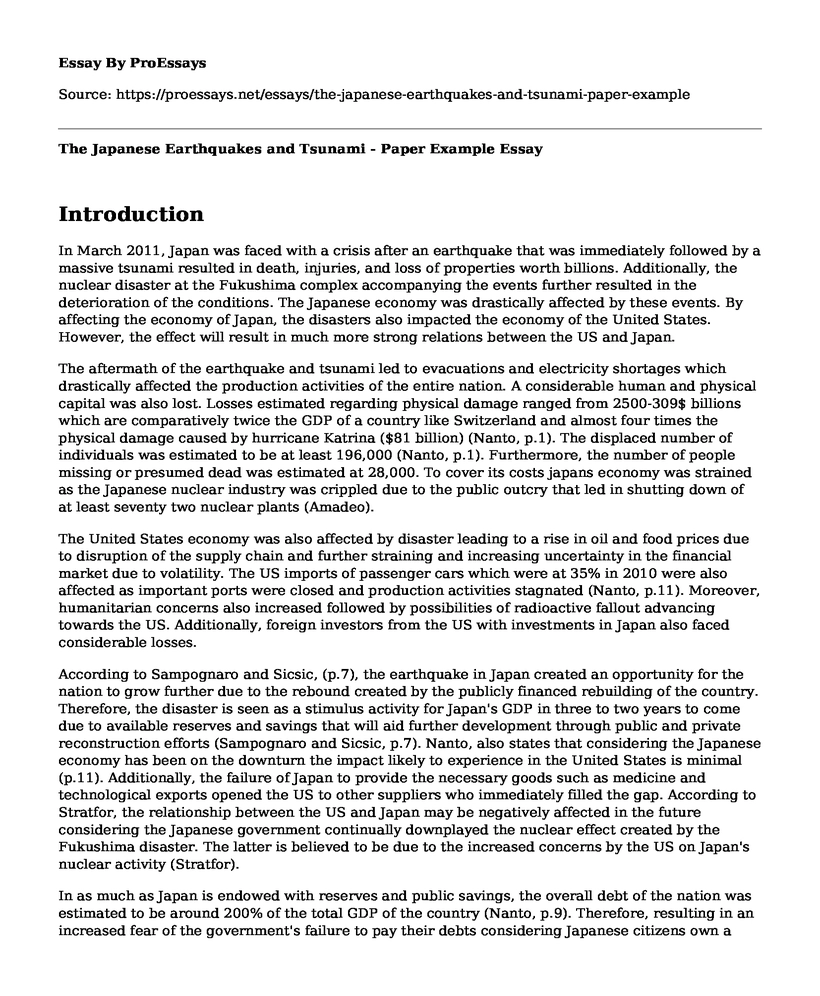Introduction
In March 2011, Japan was faced with a crisis after an earthquake that was immediately followed by a massive tsunami resulted in death, injuries, and loss of properties worth billions. Additionally, the nuclear disaster at the Fukushima complex accompanying the events further resulted in the deterioration of the conditions. The Japanese economy was drastically affected by these events. By affecting the economy of Japan, the disasters also impacted the economy of the United States. However, the effect will result in much more strong relations between the US and Japan.
The aftermath of the earthquake and tsunami led to evacuations and electricity shortages which drastically affected the production activities of the entire nation. A considerable human and physical capital was also lost. Losses estimated regarding physical damage ranged from 2500-309$ billions which are comparatively twice the GDP of a country like Switzerland and almost four times the physical damage caused by hurricane Katrina ($81 billion) (Nanto, p.1). The displaced number of individuals was estimated to be at least 196,000 (Nanto, p.1). Furthermore, the number of people missing or presumed dead was estimated at 28,000. To cover its costs japans economy was strained as the Japanese nuclear industry was crippled due to the public outcry that led in shutting down of at least seventy two nuclear plants (Amadeo).
The United States economy was also affected by disaster leading to a rise in oil and food prices due to disruption of the supply chain and further straining and increasing uncertainty in the financial market due to volatility. The US imports of passenger cars which were at 35% in 2010 were also affected as important ports were closed and production activities stagnated (Nanto, p.11). Moreover, humanitarian concerns also increased followed by possibilities of radioactive fallout advancing towards the US. Additionally, foreign investors from the US with investments in Japan also faced considerable losses.
According to Sampognaro and Sicsic, (p.7), the earthquake in Japan created an opportunity for the nation to grow further due to the rebound created by the publicly financed rebuilding of the country. Therefore, the disaster is seen as a stimulus activity for Japan's GDP in three to two years to come due to available reserves and savings that will aid further development through public and private reconstruction efforts (Sampognaro and Sicsic, p.7). Nanto, also states that considering the Japanese economy has been on the downturn the impact likely to experience in the United States is minimal (p.11). Additionally, the failure of Japan to provide the necessary goods such as medicine and technological exports opened the US to other suppliers who immediately filled the gap. According to Stratfor, the relationship between the US and Japan may be negatively affected in the future considering the Japanese government continually downplayed the nuclear effect created by the Fukushima disaster. The latter is believed to be due to the increased concerns by the US on Japan's nuclear activity (Stratfor).
In as much as Japan is endowed with reserves and public savings, the overall debt of the nation was estimated to be around 200% of the total GDP of the country (Nanto, p.9). Therefore, resulting in an increased fear of the government's failure to pay their debts considering Japanese citizens own a large percentage of the debt. Considering most citizens do not have insurance covers for events such as the earthquakes the government remains to the main reinsurer further worsening the scenario. Furthermore, imports of oil from the Gulf region and increased liquidity ratios by the Bank of Japan diminished the recovery efforts of the nation from twenty years of recession and deflation.
In as much as the US has the potential of attracting potential suppliers of Japan exports to the US, the implications are still felt as Japanese owned companies limit their operations. Moreover, Japan controlling at least one-fifth of the global semiconductor production predisposes the US economy to massive losses (Nanto, p.11). The relationship between Japan and the US will also continue to be stronger due to the interdependence and its mutually beneficial nature for the two nations. Most importantly is the dependence of the US on Japan as a significant source of financing the national debt. Japan, on the other hand, needs the security guarantee of the United States in upholding Japan's international position and peacekeeping in the Middle East.
Work Cited
Amadeo, Kimberly. Japan's 2011 Earthquake, Tsunami, and Nuclear Disaster: Economic Impact on Japan and the Rest of the World. The Balance. January 10, 2018. https://www.thebalance.com/japan-s-2011-earthquake-tsunami-and-nuclear-disaster-3305662
Nanto, Dick K., ed. Japan s 2011 Earthquake and Tsunami: Economic Effects and Implications for the United States. DIANE Publishing, 2011.
Sampognaro, Raul, and Sicsic, Michael. The impact of Japan's earthquake on the global economy. Tresor-Economies. April 2012. https://www.tresor.economie.gouv.fr/Ressources/File/371985
Stratfor. The Political Aftermath of the Japan Earthquake. Stratfor-Worldview. March 27, 2011. https://worldview.stratfor.com/article/political-aftermath-japan-earthquake
Cite this page
The Japanese Earthquakes and Tsunami - Paper Example. (2022, Jul 16). Retrieved from https://proessays.net/essays/the-japanese-earthquakes-and-tsunami-paper-example
If you are the original author of this essay and no longer wish to have it published on the ProEssays website, please click below to request its removal:
- Evaluation of the Post-Disaster Recovery in New Orleans
- Developed Countries Have Higher Responsibility Towards Global Climate Change
- Animal Rights and Environmental Ethics Essay
- Paper Example on Exxon Valdez Oil Spill
- Disaster Management in the City of Lufkin
- How Earthquakes are Predicted Using Geological Data
- Protecting the Environment: The Role of Economic Incentives - Essay Sample







